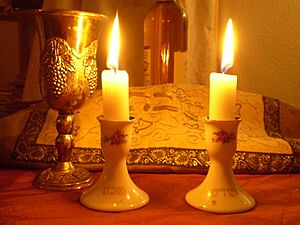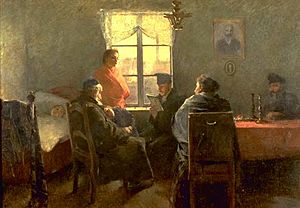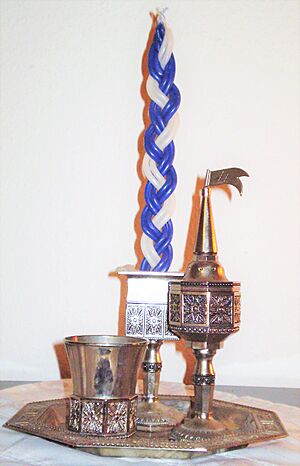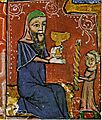Shabbat facts for kids
Shabbat is the Jewish day of rest. It happens every week on the seventh day, which is Saturday. In Judaism, a new day begins when the sun sets. So, Shabbat starts on Friday evening when the sun goes down and ends on Saturday night after it gets dark. The idea of Shabbat comes from the Bible's story of Creation. In this story, God created the world for six days. On the seventh day, He rested. In the same way, Jewish people work for six days and rest on Shabbat.
The word Shabbat comes from the Hebrew word (שַׁבָּת). The English word "Sabbath" also comes from "Shabbat." The Christian idea of Sabbath was inspired by the Jewish Shabbat, but they have many differences today. The first part of the Jewish Bible, the Torah, says that work is not allowed on Shabbat. It is a special day to rest and study the Torah.
In Jewish law, Shabbat is the most important Jewish holiday. It is even more important than holidays like Passover or Yom Kippur. Some Jewish thinkers believe Shabbat is like a perfect world. They think it's a taste of how the world was in the Garden of Eden and how it will be when the Messiah comes.
Contents
What are the Two Parts of Shabbat?
The Bible has two versions of the Ten Commandments. One version says, "Remember Shabbat to keep it holy." The other says, "Guard Shabbat to keep it holy." Jewish tradition teaches that "remember" means to celebrate Shabbat. "Guard" means resting—not working or doing business. So, Shabbat is both a day of joy and a day of rest from everyday tasks.
How Do Jews Celebrate Shabbat?
Shabbat is a very happy day. There are many special ways people celebrate the joy of Shabbat.
- Shabbat Candles: Jewish law says no one should light a fire after Shabbat begins. So, someone in each home lights candles just before Shabbat starts. Often, the woman of the house lights them. These candles should burn until dinner is over. Lighting candles helps make sure homes have light for the celebration. This old custom adds to the happiness of Shabbat.
- Blessings on Wine: The Bible says, "Wine makes the heart of a person happy." Because of this, Jewish people often use wine to celebrate happy times. The two main Shabbat meals begin with a blessing over a cup of wine. This blessing is called Kiddush. People often use a special, fancy cup for Kiddush.
- Three Shabbat Meals: On every Shabbat, Jewish people eat three meals. The first is on Friday night after evening prayers. The second is on Saturday afternoon after morning prayers. The third is late Saturday afternoon, just before Shabbat ends.
- The first two meals start with a blessing over wine, then a blessing over bread. In the Bible, God gave the Israelites two portions of manna (food) every Friday. This meant they didn't need to collect it on Shabbat. To remember this, two loaves of bread are used at the first two Shabbat meals. People use their best food, plates, and silverware for these meals. They also sing special songs called zemirot to honor Shabbat. These first two meals are usually big and formal.
- The third Shabbat meal is often smaller and less formal. Some people include bread, while others do not. Many call this meal Shalosh Seudot, which means "three meals," because it completes the set of three. This meal often includes zemirot and studying Torah.
- Shabbat Prayer Services: Shabbat prayer services are similar to weekday services but have some special changes:
- A special service called Kabbalat Shabbat ("Receiving Shabbat") is added on Friday evening.
- The Amidah prayer is different. During the week, it has thirteen blessings asking for God's help. On Shabbat, these are replaced by one blessing thanking God for the day of rest.
- More Psalms are read at the start of morning prayers on Shabbat.
- The entire weekly Torah portion is read aloud from a handwritten scroll.
- An extra Amidah prayer, called Musaf ("additional service"), is added. This prayer takes the place of an extra offering that was brought to the Temple in Jerusalem on Shabbat long ago.
- During Saturday afternoon prayers, the beginning of the Torah portion for the next week is read.
- Other Ways to Enjoy Shabbat: Oneg Shabbat means "enjoying Shabbat." This is a very important part of the day. Besides the things mentioned above, Jews enjoy Shabbat by wearing nice clothes, spending time with friends and family, resting or sleeping, and studying Torah and other religious books.
What Does "Guarding Shabbat" Mean?
Enjoying Shabbat is key, but it's also a holy day. The Torah, Talmud, and other Jewish texts have laws and rules about what Jews can and cannot do on Shabbat. These laws help keep Shabbat special and holy.
- 39 Forbidden Types of Work: The Mishnah, a part of the Talmud, lists 39 main types of work (in Hebrew, melachah) that Jews should not do on Shabbat. The rules for each type are detailed. These types of work are generally about creating new things, or fixing or cleaning old things to make them useful again.
Here are some examples of work not allowed on Shabbat:
- Lighting a fire
- Carrying anything outdoors in a public area
- Cooking
- Cleaning, except for basic hygiene like washing hands
- Traveling more than about 3 kilometers (2 miles) from your city or home
- Writing
- Farming work
- Sewing and weaving
- Building or tearing down
- Preventing Accidental Work: A "prevention" (in Hebrew, shevut) is an action that isn't one of the 39 types of work, but is still not allowed. Rabbis made these rules to help Jews avoid accidentally doing one of the 39 forbidden types of work.
- For example, buying and selling things with money is a "prevention." It's not one of the 39 types of work itself. But if someone buys or sells, they might end up writing a receipt or carrying items in a public place, which are forbidden.
- Electricity on Shabbat: Electricity is much newer than the laws of Shabbat. Rabbis have studied hard to understand how electricity fits into these laws. Most Orthodox Jewish rabbis believe:
- Using electricity to make something very hot (like an oven or a light bulb) is like lighting a fire or cooking. This is one of the 39 forbidden types of work.
- Using electricity for any of the 39 forbidden types of work is not allowed.
- Using electricity for most other things, like talking on a telephone or using a computer, is a "prevention."
- Some electrical devices, like lights, can stay on if they were started before Shabbat.
- Saving a Human Life: Jewish law teaches that one must break Shabbat laws to save a human life. If there are different ways to save a life, a person should try to choose the way that breaks Shabbat the least. But saving a life always comes first. Even if someone isn't sure they will succeed, trying to save a life on Shabbat is always the most important thing.
Shabbat in Different Jewish Groups
Conservative Judaism also teaches Jews not to do the 39 forbidden types of work (melacha). However, Conservative rabbis are often less strict about what counts as melacha than Orthodox rabbis. They are almost always less strict about "preventions" (shevut). For example, Conservative rabbis allow Jews to use electricity on Shabbat for many things, as long as it doesn't involve one of the 39 forbidden types of work.
Many members of Conservative synagogues in North America do not follow these laws strictly. Progressive Judaism, including Reform Judaism, does not believe Jewish law is strictly binding. These Jews may rest on Shabbat, but they are usually not strict about avoiding melacha or shevut. They might even add practices that Orthodox Jewish law doesn't allow if they feel it helps them celebrate Shabbat. For example, they might drive to synagogue or use musical instruments on Shabbat. Orthodox Judaism does not allow these actions on Shabbat.
Havdalah: How Shabbat Ends
Shabbat ends on Saturday night after it gets dark. The end of Shabbat is marked by a ceremony called Havdalah (הַבְדָּלָה). This Hebrew word means "division" or "separation." The ceremony "divides" the holy day of Shabbat from the new week. The Havdalah blessings are said over a cup of wine. The ceremony also uses spices with a nice smell and a candle with many wicks (cloth strings for lighting). After Havdalah, people can start doing regular weekday things again.
Images for kids
-
A silver matchbox holder for Shabbat from North Macedonia
-
Two homemade whole-wheat challot covered by traditional embroidered Shabbat challah cover
See also
 In Spanish: Sabbat para niños
In Spanish: Sabbat para niños









